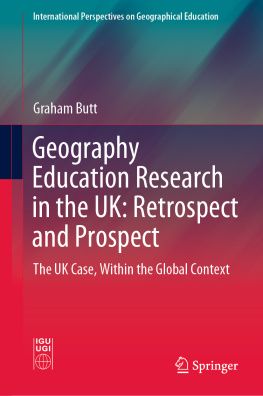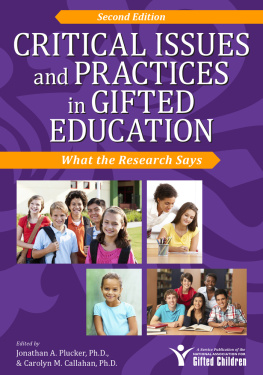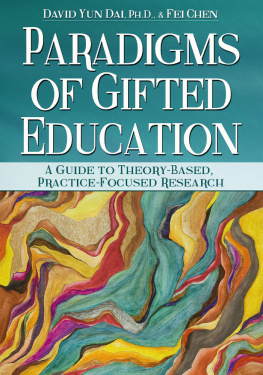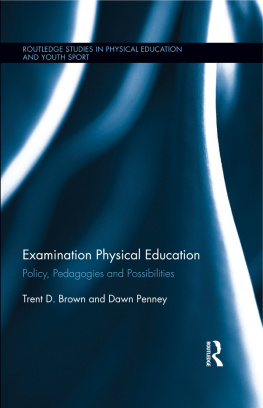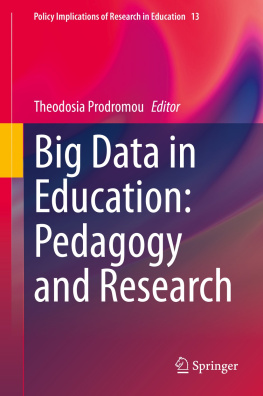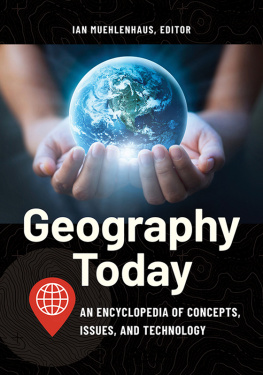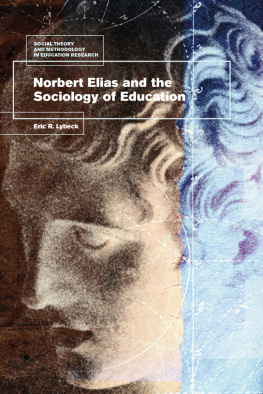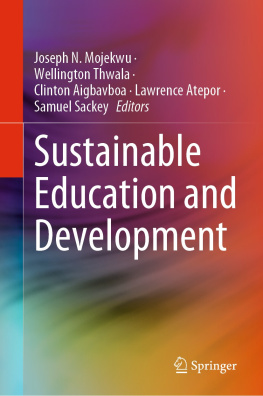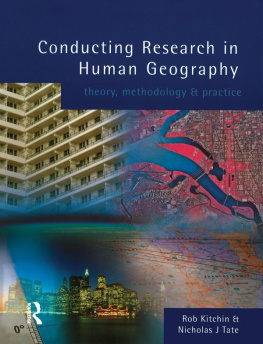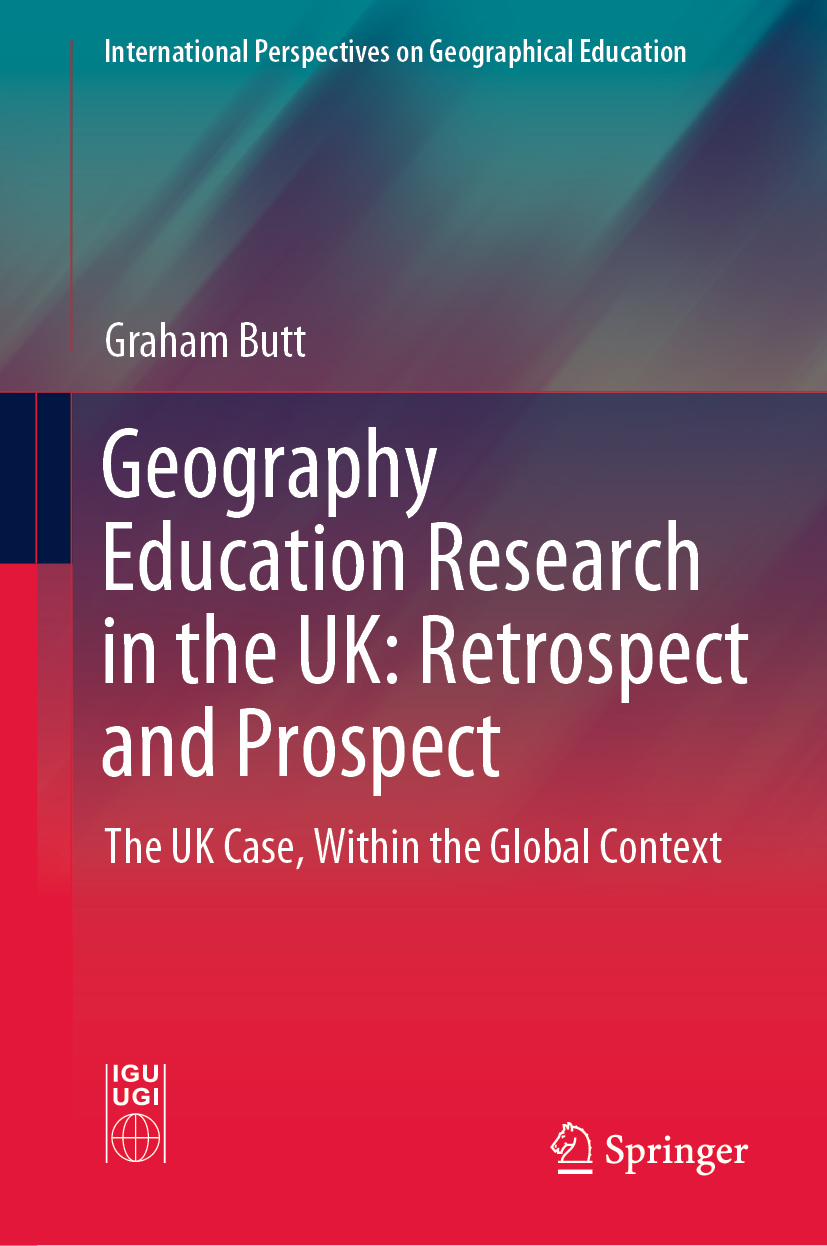International Perspectives on Geographical Education
Series Editors
Clare Brooks
UCL Institute of Education, London, UK
J. A. van der Schee
Faculty of Earth and Life Sciences (FALW), Vrije Universiteit Amsterdam, Amsterdam, The Netherlands
This series is under the editorial supervision of the International Geography Unions Commission on Geographical Education. Led by the priorities and criteria set out in the Commissions Declaration on Geography Education Research, the series plays an important role in making geography education research accessible to the global community. Publications within the series are drawn from meetings, conferences and symposiums supported by the Commission. Individual book editors are selected for special editions that correspond to the Commissions ongoing programme of work and from suitable submissions to the series editors. In this way, research published represents immediate developments within the international geography education community. The series seeks to support the development of early career researchers in publishing high quality, high impact research accounts.
More information about this series at http://www.springer.com/series/15101
Graham Butt
Geography Education Research in the UK: Retrospect and Prospect
The UK Case, Within the Global Context
Graham Butt
School of Education, Oxford Brookes University, Oxford, UK
ISSN 2367-2773 e-ISSN 2367-2781
International Perspectives on Geographical Education
ISBN 978-3-030-25953-2 e-ISBN 978-3-030-25954-9
https://doi.org/10.1007/978-3-030-25954-9
Springer Nature Switzerland AG 2020
This work is subject to copyright. All rights are reserved by the Publisher, whether the whole or part of the material is concerned, specifically the rights of translation, reprinting, reuse of illustrations, recitation, broadcasting, reproduction on microfilms or in any other physical way, and transmission or information storage and retrieval, electronic adaptation, computer software, or by similar or dissimilar methodology now known or hereafter developed.
The use of general descriptive names, registered names, trademarks, service marks, etc. in this publication does not imply, even in the absence of a specific statement, that such names are exempt from the relevant protective laws and regulations and therefore free for general use.
The publisher, the authors and the editors are safe to assume that the advice and information in this book are believed to be true and accurate at the date of publication. Neither the publisher nor the authors or the editors give a warranty, expressed or implied, with respect to the material contained herein or for any errors or omissions that may have been made. The publisher remains neutral with regard to jurisdictional claims in published maps and institutional affiliations.
This Springer imprint is published by the registered company Springer Nature Switzerland AG
The registered company address is: Gewerbestrasse 11, 6330 Cham, Switzerland
Acknowledgements
Writing a book is a process that is pleasurable, inspiring and rewardingbut also, at times, cathartic, frustrating and painful. This is the case not only for the author himself (or herself), but also for those around him.
There are always people to thankespecially those who have supported the production of the publication in different ways. I am particularly grateful to Clare Brooks and Joop van der Scheethe commissioning editors for the small collection of books on geography education research of which this publication is a part. The series is supported by the International Geographical Union Commission on Geography Education (IGU-CGE) and by the series publisher, Springer. I was delighted to work as an editor with Clare, and her colleague Mary Fargher, on the first book in this series The Power of Geographical Thinking in 2017. I hope my current offering will be as well received as that publication has been.
Special thanks must go to two of the leading lights in geography education research, nationally and internationally, who generously gave their time to be interviewed by menamely Clare Brooks and David Lambert, Institute of Education, University College London. David has been something of a fellow traveller with me during my career in geography education: he has also always been a source of level-headed, intellectually secure and inspirational thinking in the field. I spent the first three happy years of my career teaching in a state school in Hertfordshire under his direction as Head of Geographya position I took over from him when he moved to work at the Institute for the first time in 1986. Clare and David have also been close colleagues of mine in the Geography Education Research Collective (GEReCo), which Clare and I set up in 2007. Also interviewed for this book were two leading education academics from beyond the field of geography education: Christine Counsell, Ex-Lecturer in History Education at Cambridge University and now Member of Ofsteds curriculum advisory group; and Alis Oancea, Director of Educational Research at the University of Oxford, Department of Education. Both were characteristically generous with their time and thoughtsI owe them many thanks.
I must also acknowledge the receipt of one of Oxford Brookes Universitys first Research Excellence Awards, which funded a sabbatical of one semesters research leave in 2017. This afforded me valuable time away from other duties, during which much of the groundwork for this project was completed.
Finally, my thanks to those who have been affected most by my efforts to writeto my wife, Cathy, who has always been wise enough to know when to shut the door and leave me to it, especially if the writing process has become frustrating. And, finally, to my much loved Spanador (Google it!)Bramblewho joined me for long walks in Cannon Hill Park in Birmingham, and latterly in Aughton Wood in the Lune Valley, when I was trying to think things through during the writing process.
As always, errors of omission and any mistakes in the textfor which I apologiseare all my responsibility.
Brookhouse, Lancashire, UK
January 2019
Graham Butt
Contents
1. Scene Setting
1.1 Context
The introductory chapter of Geography Education Research: Retrospect and Prospect starts by raising the important question of whether geography education research, as a specialist field of intellectual endeavour (Lambert ), actually exists. Although such a consideration may appear rather incongruousresearch obviously occurs in this area, whether specialist or notit does lead us towards a discussion of the nature of research in geography education, how it might be described, whether it constitutes a field, and why (or indeed if) it matters. This approach soon raises further questions which form part of a much larger debate: concerning theory and thought in geography education, the progress made in pursuit of our research questions, the impact on research of changes in education policy and practice, and the positioning of geography education research within and beyond higher education institutions. Many of these questions are equally valid both in the context of the UK and further afield.

